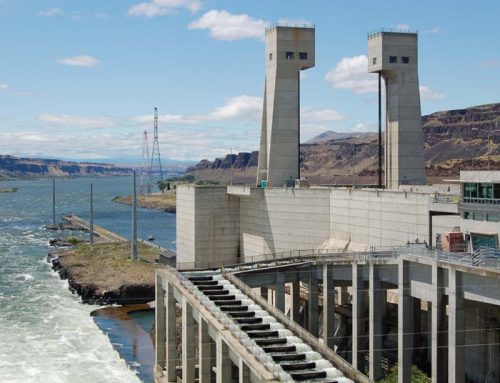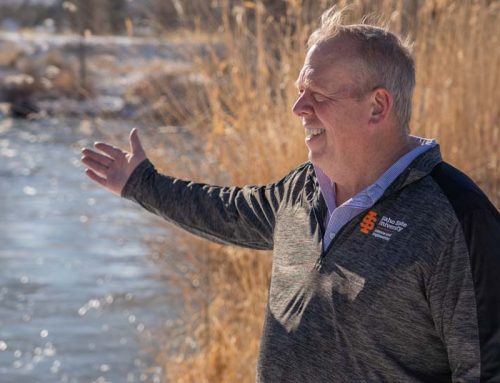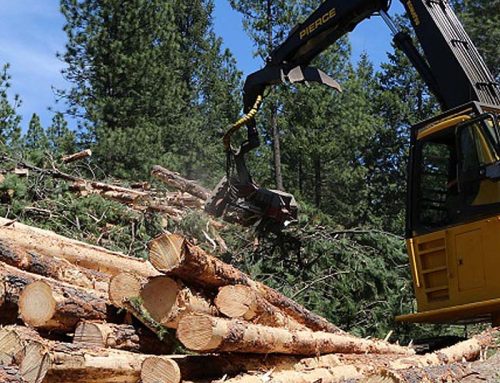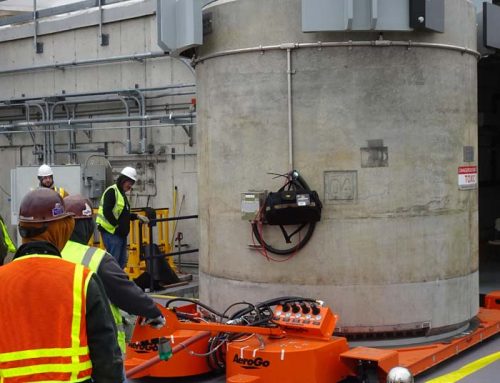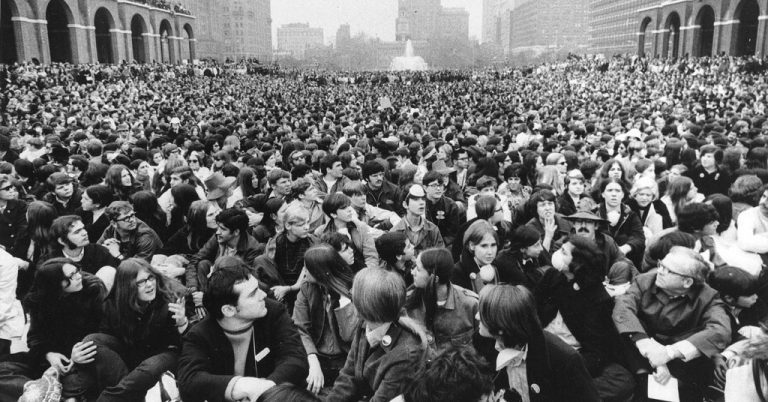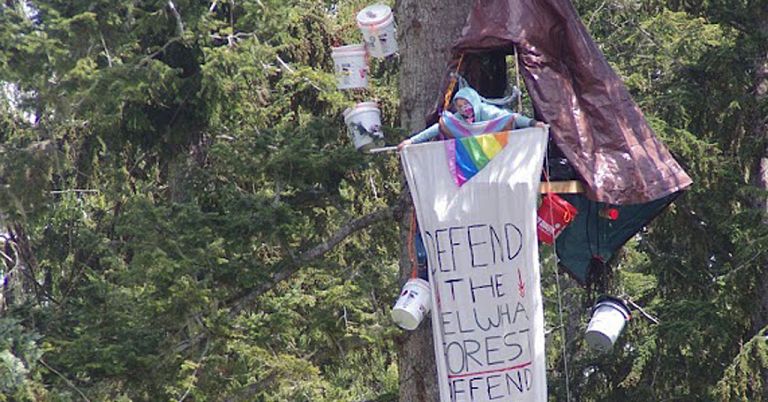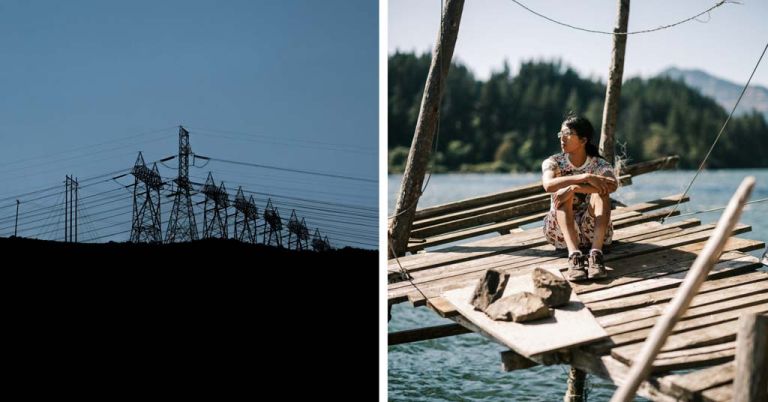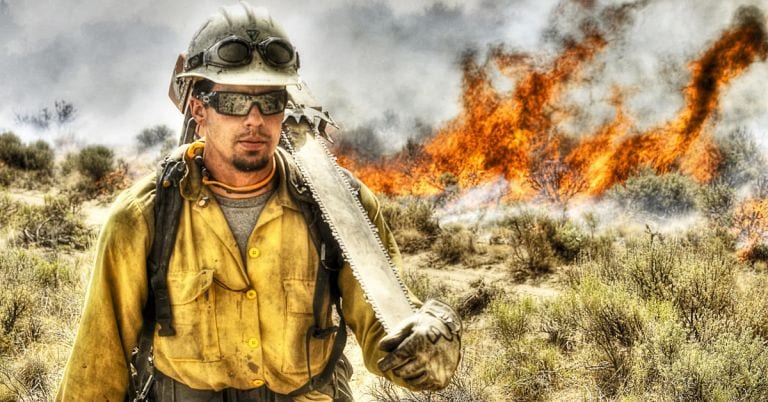As prospects for federal progress dim, environmentalists across the state are celebrating major electoral wins
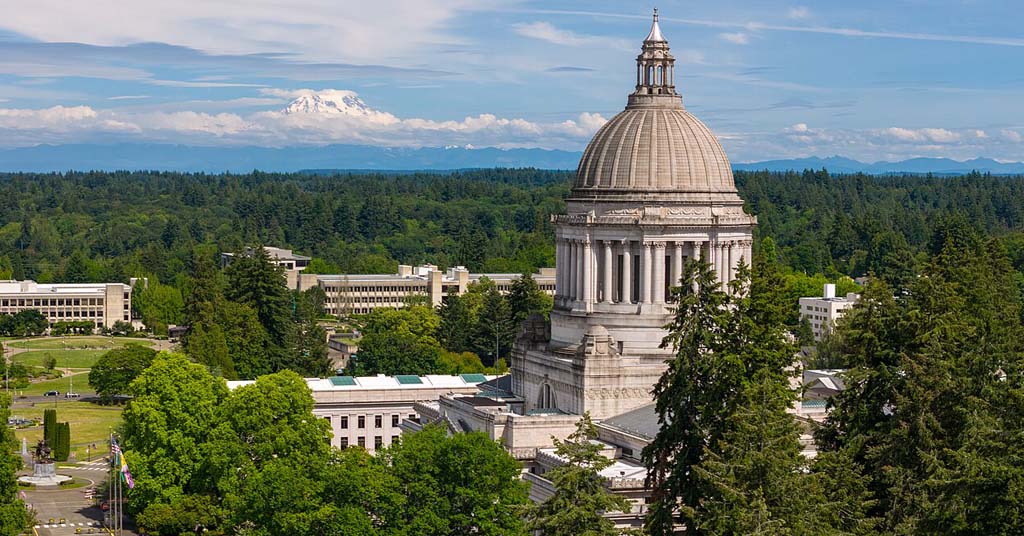
Elevated view: Voters in Washington sent a decisive environmental message to the State Capitol in Olympia. Photo: Nils Huenerfuerst/Wikimedia Commons
By Nick Engelfried. December 12, 2024. Last month, as election returns rolled in from around the country, millions of people watched the contest between Kamala Harris and Donald Trump. But Gregg Small, executive director of Seattle- and Portland-based Climate Solutions, was following the results of a Washington ballot initiative just as closely.
At stake was whether voters would eliminate the state’s most powerful tool for reducing carbon emissions.
It didn’t take long for the fate of I-2117, which would have repealed the Climate Commitment Act, to become clear. Early returns saw the initiative losing by a hefty margin, and by late evening major outlets called the race.
I-2117 had gone down in defeat.
“Washington voters sent an incredibly strong and clear message,” says Small. “This was a landslide win to protect our strongest law to fight climate change.”
For most green groups, national outcomes of the 2024 election were not encouraging.
Donald Trump’s return to the presidency will put in office a candidate who has called climate change a hoax and is openly hostile to clean energy. Republicans will control both houses of Congress, giving Trump’s party sweeping legislative and regulatory powers.
However, state-level returns in Washington tell a very different story.
Not only was I-2117 defeated, but candidates endorsed by environmental groups won several key races.
Washington isn’t the only state where local election results contrast with national returns.
However, a slate of elections with large implications for the climate, forests and more have activists here especially excited.
“In a time when so much feels divided, nearly two out of every three Washington voters just sent a clear, strong message,” says Small, referring to I-2117’s defeat.
Partly because of this, Washington seems poised to lead the way as the responsibility for action on climate change falls to states during the next Trump era.
Saving the Climate Commitment Act
If enacted into law, I-2117 would have repealed Washington’s 2021 Climate Commitment Act, or CCA, a cap-and-invest law that limits emissions from major carbon polluters and forces them to pay for the clean energy transition.
Last year, the law raised over $2 billion for clean energy, energy efficiency and projects that help make ecosystems resilient to climate change.
I-2117 would have instantly erased the CCA, hampering progress toward Washington’s goal of cutting carbon emissions 95% below 1990 levels by mid-century.

Strong message: On statewide issues, Gregg Small of Climate Solutions calls Washington’s 2024 election “a landslide win” for climate activists. Photo: Andie Petkus/Climate Solutions
Concerns about the chilling effect this would have on climate action—not just in Washington but other states considering similar cap-and-invest policies—helped bring together what Small calls “the largest and most diverse coalition in state history” to defeat I-2117.
The No on 2117 campaign included over 550 environmental, public health and social justice organizations, as well as 20 Tribes.
“A majority of federally recognized Tribal Nations in Washington state are urging voters to reject I-2117,” said Suquamish Tribal Chair Leonard Forsman, in an email to supporters shortly before Election Day. “It’s a bad piece of policy that threatens projects critical to healing this land.”
I-2117 was soundly rejected by 62% of voters. But opposition wasn’t limited to densely populated counties that normally lean progressive.
I-2117 lost in 24 of Washington’s 39 counties, including traditionally more conservative areas like Okanagan, Chelan and Yakima Counties.
It wasn’t the only statewide victory environmental activists were celebrating, though.
Protecting forests
Two days before the election, Dave Upthegrove was in Bremerton, Wash., knocking on doors with volunteers for his campaign.
The office he was running for, Commissioner of Public Lands, was being viewed as one of the most competitive statewide races in Washington. Upthegrove was asking voters to support him based on his promise to protect older “legacy” forests from logging.
On election night, activists who embraced Upthegrove’s candidacy were cautiously optimistic as early returns showed him in the lead. The following day, news outlets called the race in his favor.
“Beginning on day one, you can expect me to make different choices [from the previous Lands Commissioner] as to which timber parcels to bring forward for harvest—fulfilling my commitment to end the destruction of our mature legacy forests,” Upthegrove told Columbia Insight in an email.
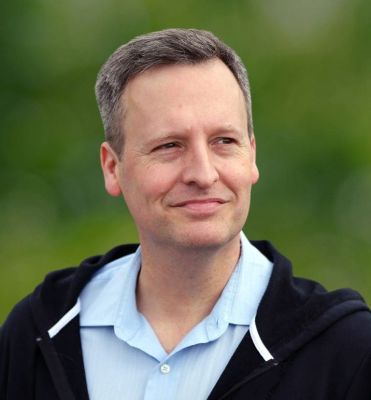
Dave Upthegrove. Photo: Upthegrove.org
Commissioner of Public Lands is an elected office with sweeping jurisdiction over more than 2 million acres managed by Washington’s Department of Natural Resources. The incumbent, Democrat Hilary Franz, has drawn ire from environmental groups for presiding over an increase in logging of forests that were lightly harvested in the early twentieth century and regenerated into complex ecosystems.
Upthegrove, a King County Council member, made this issue the central pillar of his campaign.
“Dave was elected on a very promising platform,” says Joshua Wright, a campaigner with the Legacy Forest Defense Coalition. “It’s encouraging that he is centering the public’s calls for climate action in his vision for the management of state lands, rather than the special interests of timber companies.”
Although Democrats like Upthegrove are generally favored in statewide races in blue-leaning Washington, he was no shoo-in. Franz, another Democrat who was first elected to the Lands Commissioner office in 2016, has supported an approach to forest management that in some ways more closely resembles that of Upthegrove’s opponent, former Republican Congresswoman Jaime Herrera Beutler.
Upthegrove and Herrera Beutler emerged from a crowded primary after Franz declined to run for re-election, with Upthegrove securing the second-place spot by just 49 votes.
He faced a formidable general election opponent in Herrera Beutler, who presented herself as a moderate with backing from the timber industry.
Like the No on I-2117 campaign, Upthegrove relied on a broad base of volunteers to push him over the top.
“We engaged more than 400 volunteers, contacting more than 17,000 voters directly,” he says. “Dozens of volunteers also independently organized canvassing in their communities.”
A grassroots fundraising drive helped Upthegrove compete with the timber industry dollars flowing into Herrera Beutler’s campaign. Public records show Herrera Beutler’s donors included Weyerhaeuser, Boise Cascade, the American Forest Resource Council and Timber Products Manufacturers PAC. A keyword search of Public Disclosure Commission records showed no similar contributions to Upthegrove.
“We had more than 6,000 donations, 99% from individuals and 0% from the timber industry, their corporate executives or lobbyists,” says Upthegrove.
His campaign ended up raising $1,288,961 compared to Herrera Beutler’s $781,287.
Environmental groups celebrating Upthegrove’s win hope his tenure will mark a change in direction for management of Washington state forest lands.
“We are excited to work with Dave’s incoming administration,” says Wright. “We’re hopeful he will fulfill his promise to protect all of Western Washington’s remaining legacy forests.”
Washington a national leader
Washington’s election results weren’t universally positive for the environment.
While I-2117 was defeated, another ballot initiative that impedes the transition to clean energy scraped through after more than a week of vote counting. I-2066 will make it more difficult for lawmakers to reduce fossil fuel consumption in buildings.
“The truth is, I-2066 will mean more restricted energy choices for many consumers, and higher energy bills in the long term,” says Small, of Climate Solutions.
However, as Washington environmental groups have digested statewide returns in the weeks since Election Day, they’ve found much more to celebrate than not.
This puts Washington in a position to lead state-level efforts to combat climate change.

Down not out: Some voters, like this one in Seattle’s Capitol Hill neighborhood, may been have stunned at national results. But they’re picking themselves off the pavement. Photo: AP Photo/Ted S. Warren
Washington’s new governor-elect, former Attorney General Bob Ferguson, sued the federal government 97 times during Trump’s first stint in the White House.
Many cases challenged the administration’s efforts to weaken federal laws like the Clean Air Act and Endangered Species Act.
Ferguson’s replacement as attorney general, Nick Brown, has vowed to prioritize the state’s Environmental Protection Division and prosecute polluters who violate the law.
Democrats in the legislature also protected their State House and Senate majorities, paving the way to build on existing climate and clean energy legislation.
“Environmental champions won overwhelmingly across the state,” Alyssa Macy, CEO of Washington Conservation Action, told supporters in an email soon after Election Day. She went on to say, “when conservation voters show up, we are a force.”
During the first Trump administration, Washington Governor Jay Inslee co-founded the U.S. Climate Alliance, a coalition of governors from 24 states and territories working to advance clean energy. Last month, the alliance sent representatives to the U.N. climate talks in Baku, Azerbaijan.
Most Climate Alliance states already have significant climate laws in place, but Washington stands out as ahead of the pack. This is partly because of the Climate Commitment Act, which until this year made Washington one of only two states in the country with an economy-wide cap-and-invest policy, alongside California.
In November, Oregon’s Department of Environmental Quality launched a cap-and-invest program similar to Washington’s, which has been in the works for years amid court challenges.
And in New York, Governor Kathy Hochul’s administration is developing the state’s own version of cap-and-invest.
These types of efforts are likely to be emboldened by Washington voters’ decision to keep the Climate Commitment Act.
“The presidential and congressional elections represent a monumental step backward,” says Small. “But ballot results in the Pacific Northwest show that voters and diverse coalitions in our region want to keep going, do more to protect our residents, and lead on climate and clean air.”


